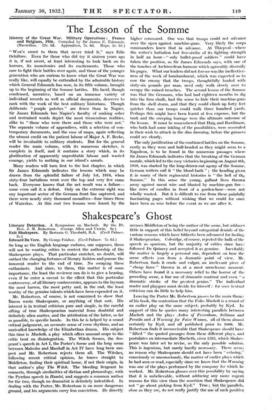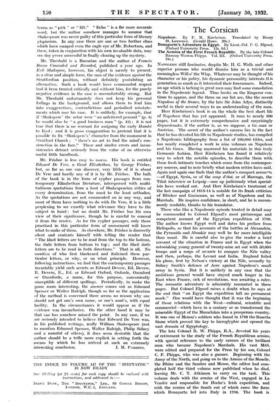Shakespea re's Ghost
Literary Detection. A Symposium on Macbeth. By the Rt.
2s.) Edward De Vere. By George Frisbee. (Cecil Palmer. Is. 61.) So long as the English language endures, one supposes, there will not be wanting critics to contest the authorship of the Shakespeare plays. That particular crotchet, no doubt, will outlast the changing fortunes of literary fashion and pursue the innocent reader to the end of time. No escaping these enthusiasts. And since, to them, this matter is of some importance, the least the reviewer can do is to give a hearing, even if he enter a caveat to the effect that this particular controversy, of all literary controversies, appears to the layman the most barren, the most petty and, in the end, the least worthy of the genuine talents which have been expended on it.
Mr. Robertson, of course, is not concerned to show that Bacon wrote • Shakespeare, or anything of that sort. His interest is in textual criticism pure and simple, in the careful sifting of true Shakespearian material from doubtful and definitely alien matter, and the attribution of the latter, so far as possible, to specific hands. In this he is helped by a sound critical judgement, an accurate sense of verse rhythms, and an unrivalled knowledge of the Elizabethan drama. His subject this time is Macbeth, a play which offers unusual scope to the critic bent on disintegration. The Witch Scenes, the Ser- .geant's speech in Aet I, the Porter's Scene and the long scene between Malcolm and Macduff in.Act IV have long been sus. pest and Mr. Robertson rejects them all. The Witches, following recent critical opinion, he traces straight to 'Middleton, finding their spiritual home, if not their origin, in that author's play The Witch. The bleeding Sergeant he connects, through similarities of diction and phraseology, with • the Pyrrhus speech in Hamlet, and suggests a common author for the two, though no dramatist is definitely indentifled. In dealing with the Porter, Mr. Robertson is On more dangerou's ground, and his arguments earry less conviction. He directly accuses Middleton of being the author of the scene, but adduces little in support of this belief beyond categorical denials of the various reasons which have hitherto been advanced for finding it Shakespearian. Coleridge, of course, rejected the bulk of the speech as spurious, but the majority of critics since have followed Dc Quincy and accepted it as genuine. Inevitably the matter is largely a personal one, dependent on how the scene affects you front a dramatic point of view. Mr. Robertson finds it crude and vulgar, an irrelevant piece or " cheap farce " thrown in at a most unwelcome moment. Others have found it a necessary relief to the horror of the preceding scene, a fine use of dramatic contrast and even " dramatic stroke of the greatest genius." The individual reader and playgoer must decide for himself : for once textual criticism can do little to help him.
Leaving the Porter Mr. Robertson passes to the main theme of his book, the contention that the Folio Macbeth is a recast of an earlier play on the same subject, probably by Kyd. In support of this he quotes many interesting parallels between Macbeth and the plays Arden of Petersham, Solimatt and Persida and A Warning for Faire Woinen, all of theM almost certainly by Kyd, and all published prior to 1606. Mr. Robertson finds it inconceivable that Shakespeare should have " lifted " the quoted passages from these different plays, and postulates an intermediate Macbeth, circa 1595, which Shakes- peare was later set to revise, as the only possible solution. This is ingenious, but surely hardly necessary. There seem: no reason why Shakespeare should not have been " echoing," consciously or unconsciously, the matter of earlier plays which he had seen or read, especially since we know that the Warning was one of the plays performed by the company for which he worked. Mr. Robertson glosses over this possibility by saying that it is unbelievable, without adducing any more cogent reasons for this view than the assertion that .Shakespeare did not " go about picking from Kyd." True ;... but the parallels, close as they are, do not really justify the use, of such positive :terms as "pick " or lift. e Echo " is a far more accurate word, but the author somehow manages to assume that Shakespeare was never guilty of this particular form of literary plagiarism. In any ease there are one or two further clues which have escaped even the eagle eye of Mr. Robertson, and these, taken in conjunction with his own invaluable data, may one day prove successful in finally clearing up the mystery.
Mr. Theobald is a Baconian and the author of Francis Rayon Concealed and Revealed, published a year ago. In Exit Shakspere, however, his object is merely to present, in a clear and simple form, the sum of the evidence against the Stratfordian position, without definitely postulating an alternative. • Such a book would have commanded respect had it been treated critically and without bias, for the purely negative evidence in the ease is uncomfortably strong. But Mr. Theobald unfortunately does not keep his personal feelings in the background, and allows them to lead him into exaggerations, contradictions and periodical misstate- ments which mar his case. It is unlikely, for example, that if ` Shak.spere the actor were "an unlettered peasant" (p. 4) he would also be " a good business man " (p. 42) ; it is not true that there is no warrant for assigning the early Hamlet to Kyd ; and it is gross exaggeration to pretend that it is possible to fix Shakspere's ' character from the monument in Stratford Church : " there's no art to find the mind's con- stnietion in the face." These and similar errors and incon- sistencies detract seriously from the value of an otherwise useful little handbook.
Mr. Frisbee is less easy to assess. His book is entitled Edward De Vere, a Great Elizabethan, by George Frisbee, but, so far as one can discover, very little of it is about De Vere and hardly any of it is by Mr. Frisbee. The bulk of the book is in the form of cypher passages from con- temporary Elizabethan literature, interspersed with multi- tudinous quotations from a host of Shakespearian critics of every denomination, from the most to the least orthodox. As the quotations are not commented on in' any way, and most of them have nothing to do with De Vere, it is a little perplexing to see exactly what relevance they have to the subject in hand ; but no doubt Mr. Frisbee has his own view of their significance, though he is careful to conceal it from the reader. As for the cypher passages, only those practised in this particular form of amusement will know what to make of them. As elsewhere, Mr. Frisbee is discreetly silent and contents himself with telling the reader that " The black letters are to be read from the top to the bottom, the italic letters from bottom to top ; and the black italic letters are to be read in both directions." That is all. No
mention of who first blackened and italicized these par- ticular letters, or why, or on what principle. However, following instructions, we find that the contemporary passages invariably yield such secrets as Edward Devere, Ed. Des-ere, E. Des-ere, E., Ed. or Edward Oxford, Oxfordc, Oxenford or Oxenforde, a name, for this purpose, conveniently
susceptible of different spellings. Periodically, to make the game more interesting, the answer comes out as Edmund Spenser or Walter Raleigh, though so far as the application of the method is concerned there seems no reason why one
should not get one's own name, or one's aunt's, with equal facility. In the circumstances it would appear as if the evidence was inconclusive. On the other hand it may be that qui:, has somehow missed the point. In any case, if we
are seriously intended to believe that Edward De Vere was, in his published writings, really William Shakespeare (not
to mention Edmund Spenser, Walter Raleigh, Philip Sidney and a narutful of others), it does seem desirable that the' author should be a trifle more explicit in setting forth the means by which he has arrived at such an extremely





































 Previous page
Previous page